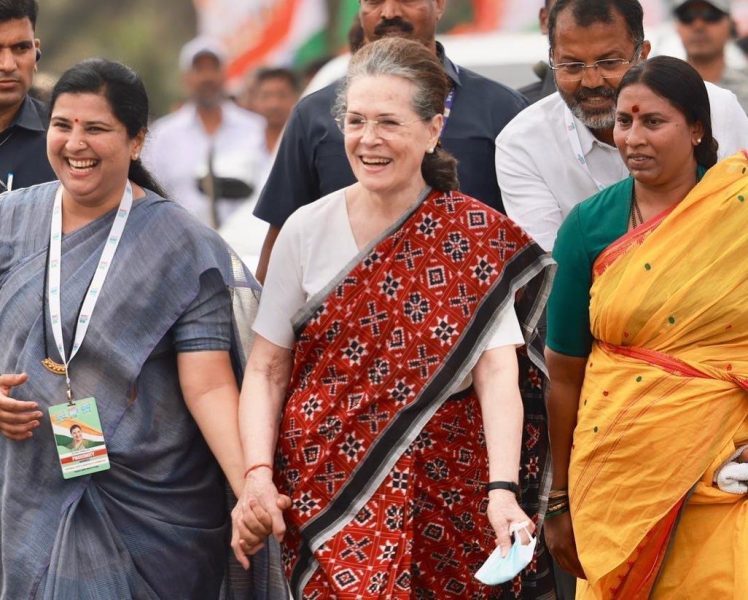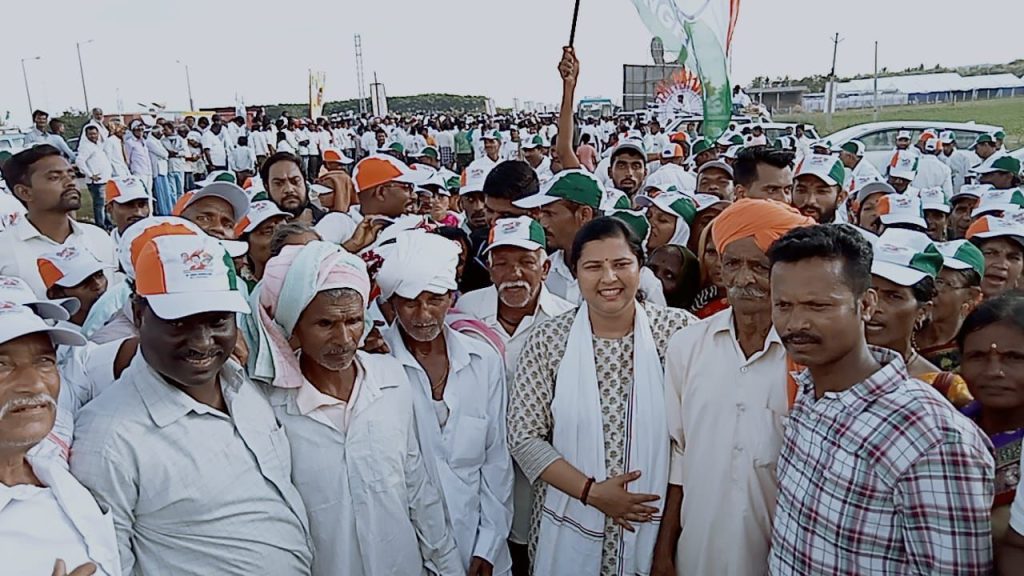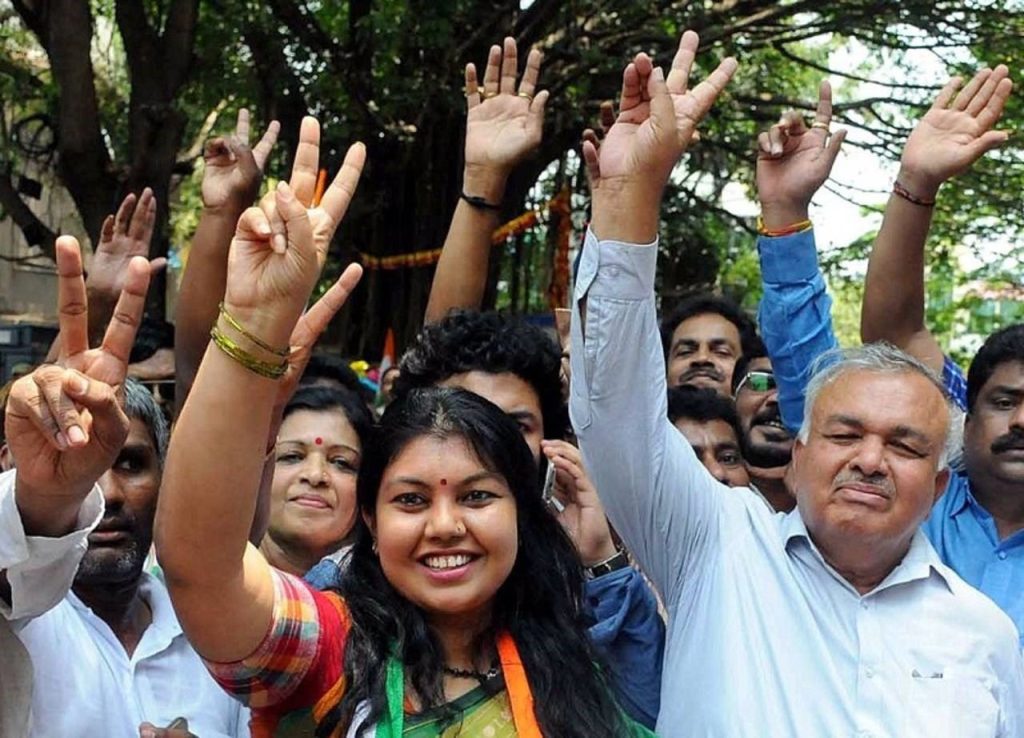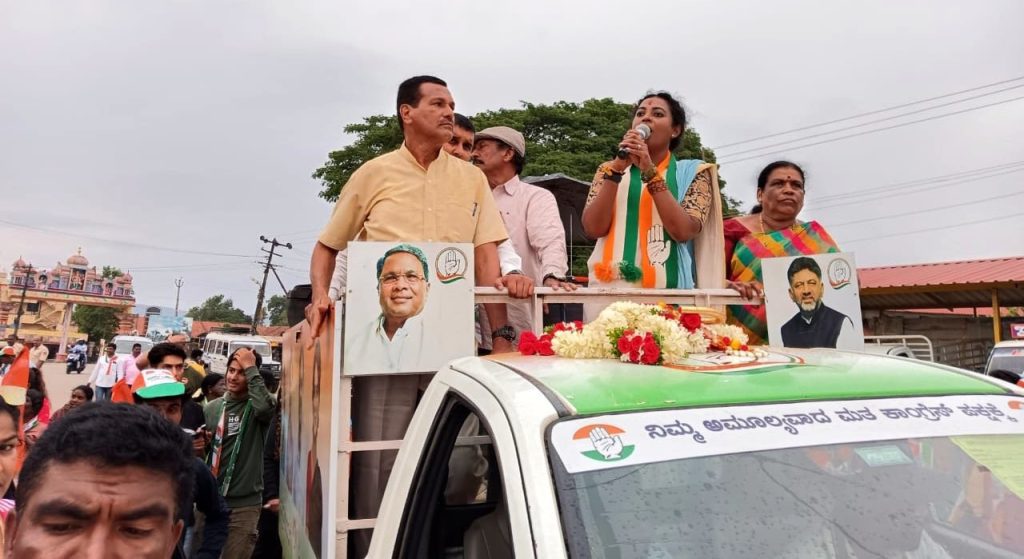
Karnataka's 'missing women': Where did the women candidates go this time?

Belying its image as a progressive and developed state, Karnataka, which goes to polls on May 10, shows a marked lack of gender inclusivity with an abysmally low percentage of women political candidates contesting elections.
In fact, though the BJP and Congress have voiced their commitment to ensure reservation of ’33 per cent of seats in the Lok Sabha and state legislative assemblies for women’, the ground reality is that the percentage of women they fielded in the Karnataka assembly elections barely reached the double-digit. BJP and Congress fielded only 12 and 11 candidates respectively and this is out of the 224 candidates each they gave tickets to in the May 10 polls.
The Janata Dal (Secular) or JD(S), the other major party in Karnataka, has 13 women on its list, along with its alliance partners.
On one side, the percentage of women voters has shot up, accounting for 49.69 per cent of the more than total 5.2 crore voters, which is incidentally the second highest (in percentage terms) since 1962. But, the participation of women as candidates in the electoral democratic process in the state stands at a negligible 7.6 per cent of the total number.
It is surprising that Karnataka should be in such a situation since it was the first state to reserve 25 seats for women in the Panchayat Raj system in the early 1980s, when Ramakrishna Hegde was the chief minister, wrote CJ Manjula, a member of the Network of Women in Media on the website.
This was a decade before the 73rd amendment to the Constitution, which granted one third reservation of seats to women in local bodies across the country. The state, according to the article titled “Karnataka 2023: Where are the women”, moreover, had no shortage of inspiring pioneers and role models for women’s political leadership such as Kamaladevi Chattopadhyay, who hailed from Mangaluru. The 29 constituencies in Bengaluru too have not fared better when it comes to having women candidates with the exception of Sowyma Reddy who was elected from the Jayanagar constituency in 2018.
Also read: Bengaluru: In tight assembly contest, 50:50 chances for BJP, Congress
In the 2018 assembly elections, the situation was not much better. Out of the 2,626 candidates fielded, 209 were women, which constituted less than 8 per cent of the total number. In the 2023 legislative assembly elections, out of the 2,613 candidates, there are only 185 female candidates. According to political experts the poor representation is linked to the fact that decision-making in political parties involves few women.
Sad spectacle
Terming the lack of women representation in seats in Karnataka assembly elections as a “sad spectacle”, Sandeep Shastri, political analyst, national coordinator of the Lokniti Network, told The Federal, “The decision making in political parties is male-dominated. There are not enough women or strong enough women in these political parties to fight for the representation of women in elections. Winnability is the factor that is often used by these male dominated parties as an excuse.”
But, Shashtri said there are studies to show the percentage of women who win elections in India are higher than the percentage of men who do so.
Dr Anjali Nimbalkar, who is the sitting Congress MLA from the Khanapur seat located in Belagavi district, admitted that she got a ticket relatively easier from her party this time for 2023 upcoming Karnataka Assembly Elections. The Congress has reposed faith in the gyaneocologist, whose husband is the inspector general police of Karnataka, after having won the same seat defeating BJP candidate Vithal Halagekar in the 2018 elections.

According to the 46-year-old gynaecologist by profession, in an interview to The Federal, she said that it was a “challenge” to get a Congress ticket the first time in 2018. But, it did not have to do with the fact that she was a woman, she said. “It was more because I was considered as an “outsider” since I am not originally from Karnataka and don’t belong to Khanapur. My husband has been working in the Karnataka IPS cadre for the past 25 years,” she said, adding that the survey reports tilted in her favour due to the social work she had done in the area from 2013.
“They were left with no option but to give me a ticket,” pointed out Dr Nimbalkar.
Women need to believe in themselves
According to Dr Nimbalkar, the “akathai sammelans” that she had done with her husband, who had been an SP at that time in Belgaum, discussing women’s issues like dowry harassments; the hospitals and roads she has built in the 1,800 sq km constituency, which largely is made up of forest areas, and ensuring electricity is available helped her to connect with the people. According to her, there are not enough women who are willing to take on the rigours of politics. “It is a 24 hour job, you have to be there for people all the time,” she said.
Also, Nimbalkar has forbidden husbands to sit in for women panchayat leaders. ” I am very strict in my constituency about this. Even if the women make mistakes, I tell them it doesn’t matter. They will learn in a month or two, and they pick up very fast. Out of 51 gram panchayats in the constituency, I have 250 to 300 women members, who are learning about governance slowly,” she said.
Not against the women’s reservation bill pending in Lok Sabha, she is not for it either, she said. “I don’t want to beg men for opportunities. I am no cry-baby or feel inferior to men in anyway. Women have to believe in themselves, be confident and not get bogged down by the money factor. Many people may not want to spend large sums in their constituency but these are the factors that can help you win in politics. I started with social service, I had a raw constituency with no facilities at all. My focus has been on providing education and health care facilities and that is why people here connect with me,” she pointed out.
In fact, Dr Nimbalkar is fighting this election on the ‘development’ platform and is confident she will win the seat again. Her constituency, which borders Maharashtra and Goa, is made of farmers who she believes will vote for her. Nimbalkar, hails from a “hard-core political family” and happens to be the cousin of no less than the former Maharashtra minister, Ashok Chavan and the niece of Congress strongman late Shankarrao Chavan.
If you ask her if her political lineage helped her in anyway, Dr Nimbalkar said that she prefers to be known for her work than her political ancestry.
Patriarchal mindset of political parties

Dr Sowmya Reddy, sitting MLA of Jayanagar constituency and the only woman MLA in IT city, Bengaluru, believed the obstacle for women in politics is the “patriarchal mindset of political parties”.
“Representation of women in Indian politics, especially in Karnataka is getting abysmal. There is just 4 per cent women in the state legislative assembly, political parties keep quoting winnability but they need to proactively bring women into positions of power,” she said.
According to government data, Karnataka along with Maharashtra, Tamil Nadu and Telangana and others have less than 10 per cent women legislators.
The state legislatures which have more than 10 per cent women lawmakers are surprisingly Chhattisgarh (14.44), Jharkhand (12.35), Punjab (11.11), Rajasthan (12), Uttarakhand (11.43), Uttar Pradesh (11.66). West Bengal (13.70) and Delhi (11.43) too are above 10 per cent.
Sowmya Reddy admitted honestly that she had “very little chance” of making it in politics if not for her father, former minister and seven time MLA, Ramalinga Reddy.
“It is not impossible for women to join politics but it is very tough. I face sexism, ageism, misogyny, I am accused of manslaying, a lot of rowdyism has crept into politics. They are running a smear campaign against me, and I have filed many defamation suits. This is because of the patriarchal mindset of the BJP they don’t want women to come up in politics,” said Reddy, who was returning from the police commissioner’s office while talking to The Federal because of the threats she was receiving.
Reddy, unlike Dr Nimbalkar felt that the women’s reservation bill will help to increase women’s participation as candidates in elections.
Have to be tough cookie, says Nayana, Congress Mudigere candidate

Nayana Jyothi Jhawar, a former corporate lawyer is the Congress candidate in the reserved constituency of Mudigere in Chickmangular district. She is facing a tough challenge from BJP’s Deepak Doddaiah and JD(S) MP Kumaraswamy. In 2018, Kumaraswamy, who had been in the BJP had won the election by defeating senior Congress leader, Motamma, Nayanna’s mother, with a margin of 12,512 votes.
Motamma, who represented Mudigere from 1978 to 1999 was Member of the Legislative Council from 2006 to 2012 and was elected again on June 18, 2012. Hailing from the backward class, Motamma has been responsible for setting up Stree Sakthi, a programme for the upliftment of women.
Nayanna wants to follow in the footsteps of her mother. However, being the daughter of a politician can be a double-edged sword and it has its challenges, she confessed. According to Nayanna, the poor representation of women in this election is probably due to the factor of “winnability”. But, she felt that women have proven themselves to be equal to men in this field and it’s time for the glass ceiling to be broken. The women reservation bill is a step in that direction, she felt.
In politics, you have to be a “tough cookie” like an Indira Gandhi or Mamata Banerjee, she said on the challenges of being a woman politician. Women are scrutinised at every level and the target of personal attacks, she said. Nayanna, who got a ticket in this constituency despite protests against her candidacy by workers in the Congress parties, said she is fighting this election on the issue of development and corruption.
Women legislators perform better
Analysing the obstacles behind women not entering Parliament in India (out of 542, 78 are female MPs), an Observer Research Foundation paper quoted Thushyanthan Baskaran et al, who have shown that women legislators perform better in their constituencies on economic indicators than their male counterparts. Further, the study found that women legislators “are less likely to be criminal and corrupt, more efficacious, and less vulnerable to political opportunism.”
However, political parties manage to make successful women politicians into an ‘ineffective minority’ and prevent them from facilitating gender inclusiveness. Shastri felt that women have proven to show greater sensitivity and response to issues but men in political parties feel threatened by women. This is one reason, the one third reservation for women bill has not been passed in Lok Sabha because the men fear that they will lose their own seats.
Women too seem daunted by the mudslinging, smear campaigns and character assassination that is more rampant of late. They also feel vulnerable to abuse and threats with the proliferation of social media.
Financing is also a major obstacle as fighting elections can be expensive, and huge financial resources are required to put up a good fight, said political candidates. According to Reddy, money power was very visible during the campaigning this time in Bengaluru. Moreover, if parties fail to support them, women candidates are compelled to organise their own campaign financing. It seems that it will take more than a reservation bill to see more women in the corridors of legislative assemblies.


